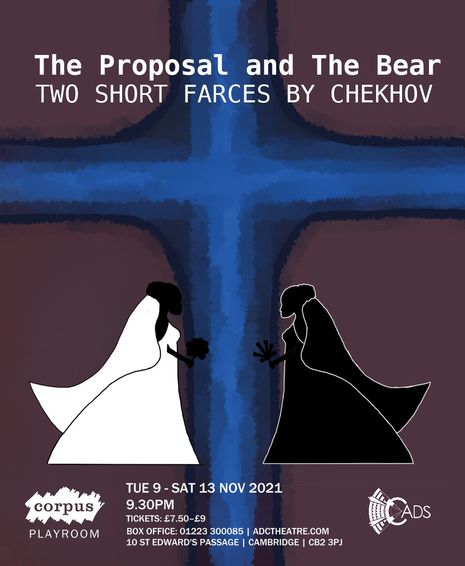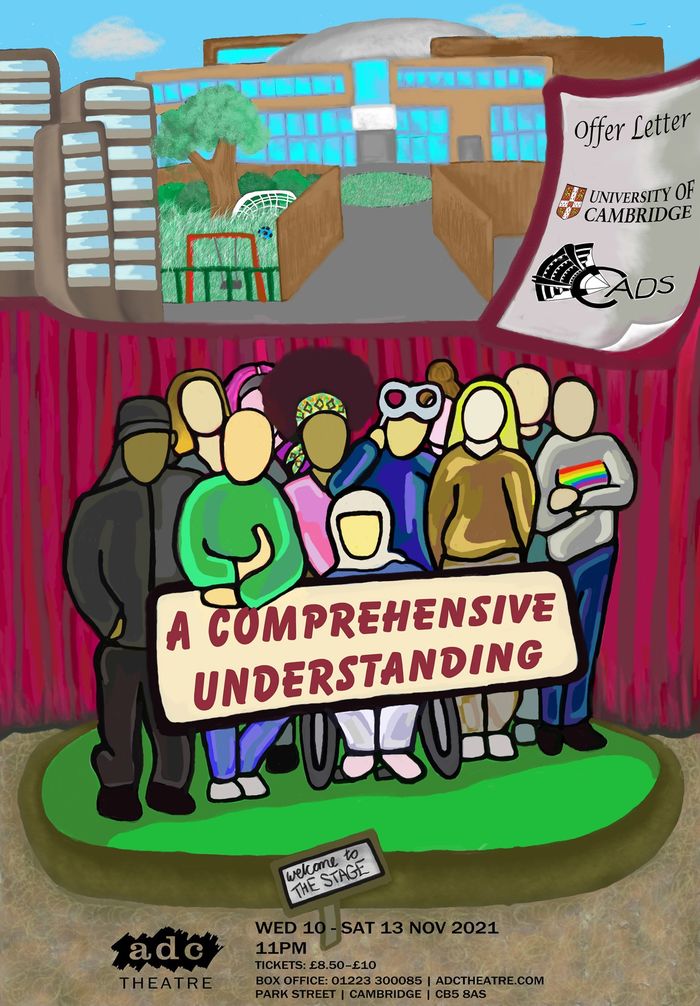Two Plays By Chekhov is classic theatre brought to the 21st century
Tommy Gilhooly reviews this weeks Corpus lateshow, Two Plays By Chekhov

Farce may seem outdated, Victorian and obsolete, yet Dylan Evans’ rendering of two of Chekhov’s farces (The Proposal and The Bear) brings their action into the now with all the entailed humour being very accessible. As Evans said himself in a pre-show interview, the war between material greed and desire to love is still as relevant to us in the 21st century as it was in feudal Russia.
“The whole piece was fluid, rapid, witty and rampant”
The acting was very good from Christian Longstaff (Chubukov/Smirnov), Sophie Carlin (Stepanovna/Popova), and Tom Shortland (Lomov/Luka), being both engaging and playful. Particularly Shortland, who was entertainingly melodramatic, but without going overboard. A small cast, but one which was effective, especially in taking on the new roles and varied personas straight from The Proposal to The Bear. These are not necessarily easy plays to handle in term of dramatic staging, with the humour always being at risk in being lost in translation or time. Yet the neurotic, hysterical style of the delivery from the stage was consistently hilarious. In addition, the various engagements with the audience by the cast were effective and captivating. Overall, the whole piece was fluid, rapid, witty and rampant; all extremely well suited to the farcical atmosphere. Costumes too were simple, but certainly well selected and fitting for the characters.
The economic spareness of the set allowed the actors to come in their own; without a cluttered stage, the audience’s attention was fixed on the cast and their command of the short pieces. As Evans mentioned in a pre-show interview, the shortness of the plays themselves allowed the actors to explore their roles and experiment, not being committed to just one role for the whole rehearsal process or on the nights of the show itself.
Without sabotaging the plot of either of the farces with spoilers, The Proposal revolves around a precarious jostling between ludicrous lovesickness and yet more ridiculousness bickering over land-ownership in Russia’s semi-feudal system. This dynamic translated well onto the stage and was amusing, especially towards the climax. Better still was the juxtaposing between the sobs of the widower and the ranting of a debt-collector misogynist in The Bear. By the climax, we are witnessing a pistol-dual between unrequited lovers; its preposterousness is wickedly witty. Moreover, a change in lighting, used sparingly through the production, was especially effective at this point.
For a farce (The Proposal) which Chekhov advised his director to “roll cigarettes out of it for all I care”, Two Plays By Chekhov was a production executed well. It is well worth going to see for those that want to grab a drink and then enjoy a few laughs at the expense of the absurdness and ridiculousness we are all prone to – whether that be turn of the century Russia or the everyday of Cambridge. Two Plays By Chekhov was fast, witty, economical and fun. If the attempt was to illuminate how Chekov’s satirical genius is as applicable to his time as to ours both the production team and cast have certainly succeeded.
 Comment / Plastic pubs: the problem with Cambridge alehouses 5 January 2026
Comment / Plastic pubs: the problem with Cambridge alehouses 5 January 2026 News / Cambridge academics stand out in King’s 2026 Honours List2 January 2026
News / Cambridge academics stand out in King’s 2026 Honours List2 January 2026 News / Cambridge businesses concerned infrastructure delays will hurt growth5 January 2026
News / Cambridge businesses concerned infrastructure delays will hurt growth5 January 2026 News / AstraZeneca sues for £32 million over faulty construction at Cambridge Campus31 December 2025
News / AstraZeneca sues for £32 million over faulty construction at Cambridge Campus31 December 2025 Interviews / You don’t need to peak at Cambridge, says Robin Harding31 December 2025
Interviews / You don’t need to peak at Cambridge, says Robin Harding31 December 2025









